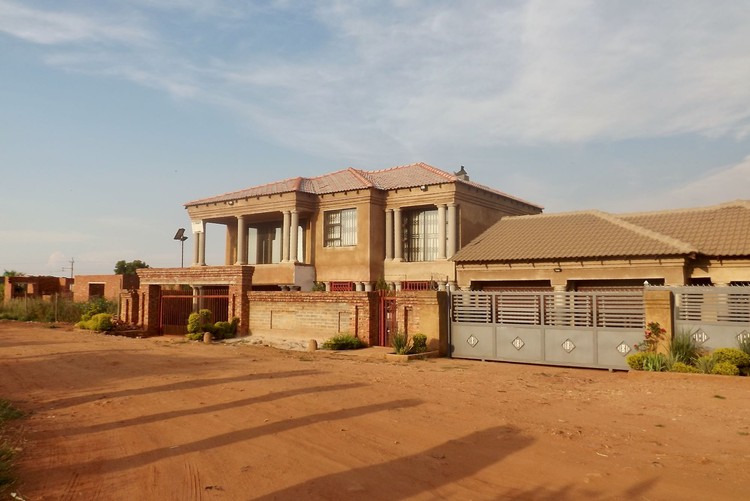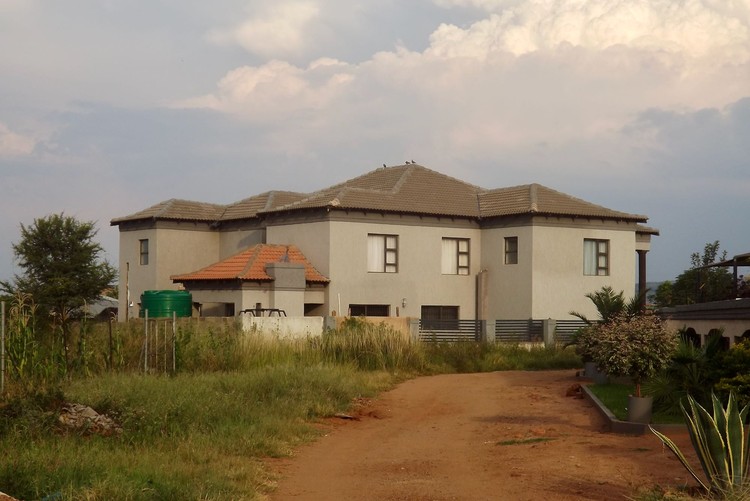City of Tshwane mum on “investigation” into illegal suburb
Leeuwfontein developer and residents say the City has never contacted them
A house in Leeuwfontein – an illegal suburb that the City of Tshwane says it is still investigating. Photos: Warren Mabona
- Last year the City of Tshwane said it was investigating an illegal suburb called Leeuwfontein near Mamelodi.
- But the Leeuwfontein residents we spoke to and the land owner told us that no one from the City has come to interview them.
- Leeuwfontein has over 300 households, many with large brick and mortar buildings, but the residents have no title deeds and they want municipal services.
When GroundUp started asking questions last year about Leeuwfontein, an illegal suburban development in Mamelodi, east of Pretoria, the City of Tshwane said it had issued contravention notices to the landowners and had launched an investigation.
Seven months later, we sent a list of questions asking about the investigation, only to receive a one-line email from the “Media Team” saying: “In all important respects, this is a complex investigation and it is ongoing.”
But the Leeuwfontein residents we spoke to told us that no investigator from the City has come to interview them.
GroundUp estimates there are about 300 households and development continues. A number of residents have built large houses. They are anxious and currently living in limbo, without title deeds. Besides a water truck, they are without municipal services, some for six years now. They also allege that they were misled when they purchased their plots.
They said they had hoped the City’s investigation would eventually lead to the suburb becoming formalised, that they would then get title deeds, and services would be rolled out.
“I really doubt if the City has launched an investigation,” said Lebogang Motibe, who bought her plot for R94,000 in 2018. “I have never seen anyone from the City coming here to investigate. The City must tell us how far the investigation is.”
“You cannot investigate the illegal sale of land for such a long time without contacting us, the victims, and the person who sold us plots,” said resident Mandla Mthimkhulu. “I know that the formalisation of every area takes a long time to conclude, but an investigation into the illegal sale of land should not last for such a long time.”
In June last year, spokesperson for the City Selby Bokaba said the land owners are Mirror Development Projects Trust (now named Mirror Developers), owned by Malesela Marema. They also provided us with the name of one other individual and an obscure company, neither of which GroundUp could trace.
Marema, who confirmed he had sold the plots, said Mirror Developers had applied to the City in 2010 for the establishment of a township and submitted all the requirements to its head office in person. After he received no response, he said he again submitted in 2013 and has been receiving communication with the City since then.
But he also says no investigator from the City has ever contacted him since it announced its probe last year.
Ward 93 Councillor Rabasotho Masupha (ANC) said he was working with the plot owners to “ensure that we find a solution … which is around the non-compliance of the Township Establishment Act”.
He said he was pursuing the provincial government in the hope it could help resolve the legal tangle.
Leeuwfontein may look like a suburb being developed, but it is in fact an informal settlement.
Next: Unemployed doctors march to Union Buildings
Previous: Four people shot on public works property in Wynberg
Letters
© 2024 GroundUp. This article is licensed under a Creative Commons Attribution-NoDerivatives 4.0 International License.
You may republish this article, so long as you credit the authors and GroundUp, and do not change the text. Please include a link back to the original article.
We put an invisible pixel in the article so that we can count traffic to republishers. All analytics tools are solely on our servers. We do not give our logs to any third party. Logs are deleted after two weeks. We do not use any IP address identifying information except to count regional traffic. We are solely interested in counting hits, not tracking users. If you republish, please do not delete the invisible pixel.




